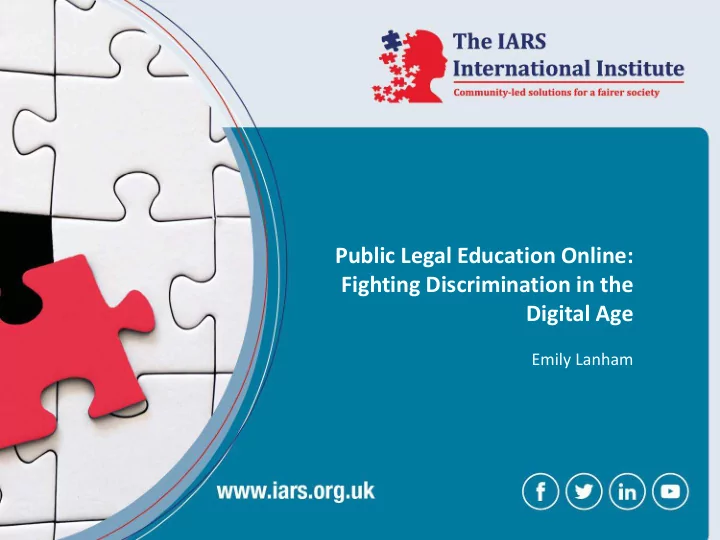

Public Legal Education Online: Fighting Discrimination in the Digital Age Emily Lanham
A brief background … - Since 2000, legal services have been offered online: predominantly legal aid covered free face-to-face advice, or paid for legal services. - 2001 Survey of Justiciable Problems: 4.1%civil justice problems were looked up online - 2004 Civil and Social Justice Survey (CSJS): 10.4% problems - 2006 CSJS: 14.1% problems - 2007 CSJS: 15.6% problems - 2008 CSJS: 17.7% problems - Since 2010 and cuts to legal aid, an increased pressure has been put on the internet to provide a public legal education solution
Who is it for? Young people? - Research suggests they are the least likely to access legal solutions online Over 60s? - Research suggests they are excluded from internet solutions, although increasingly technology reliant Anyone in between? - Research suggests that there are too many variables and exclusions to rules that it’s hard to pin point who actually uses the internet for proactive PLE
What are we looking up? The Legal Problem Resolution Survey Who took part? - 18+ adults - No businesses - No-one in prisons, care homes or outside household population 11 distinct problems: - Civil legal: - Purchasing goods and services - Neighbours and anti-social behaviour - Money problems - Personal debt - Accidents/negligence - Owning/buying residential property - Administrative legal - Employment - State benefits - School education - Family legal - Relationship breakdowns
What does this look like in every day life? How do we think of these problems? - 23% thought of their problems as a legal one from the outset - 54% thought of it as “bad luck” or “part of life” - Those who had neighbour issues, or anti-social behaviour were more likely to think of it as a criminal problem (23%) Discrimination - 22% who experienced an administrative problem (employment, housing) felt they had suffered discrimination (age, race and disability the most) Solutions? - Formal resolution process (17%) - Legal or professional information (lawyers or CAB) (39%) - Self-help (90%) - Did not try to resolve (4%)
Why we’re bad at using the internet for solutions… 1. We’re self taught – there’s no rule book 2. We’re impulsive and sporadic 3. Reduced vocabulary/impenetrable jargon? 4. Quick fix mentality 5. Reliance on search engines 6. Unwilling to invest 7. We’re looking for an answer we want…
How PLE could work better online 1. Reflect what people look for 2. Careful pathways 3. Mixed methodology 4. Personal experiences
Thank you!
Recommend
More recommend